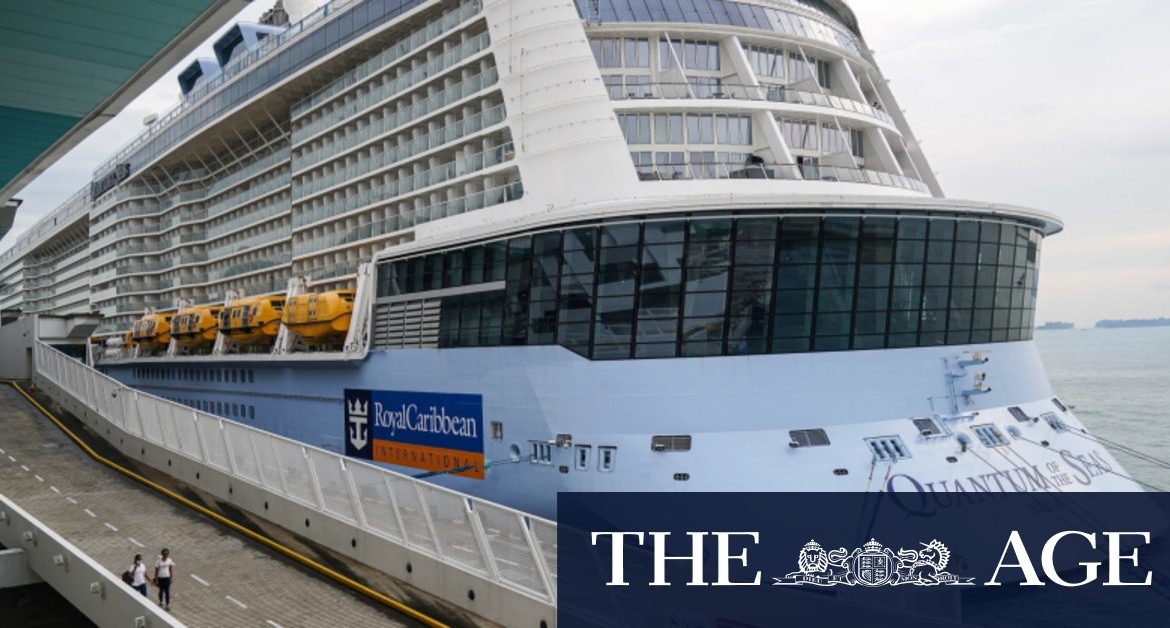Passengers were confined to their cabins after a passenger tested positive for COVID-19.Credit:Danial Hakim
The coronavirus patient, an 83-year-old male, had reported to the ship’s medical centre with diarrhoea and a subsequent onboard test revealed the infection. He was taken to hospital on Wednesday after the ship returned to port.
However, two further tests from the patient have come back negative for COVID-19 infection, the Singapore Tourism Board (STB) said. Another test will be conducted on Thursday to confirm his infection status.
Other guests were awoken with the news of the infection in the early hours.
“I was like: ‘there it goes, the worst fear has happened’,” said passenger Melvin Chew, a 31-year-old business development manager, who said he learned about the infected guest via an announcement on the ship’s tannoy around 3am.
The Quantum of the Seas returned to Singapore at 8am local time, and a witness saw some passengers disembarking at about 8pm. All passengers will undergo mandatory COVID-19 testing before leaving the terminal.
The ship’s captain told passengers over the public address system that the passenger disembarkation process would start around 7.30pm and would take 3-4 hours. The crew would rest overnight and take PCR tests in the morning, he added.
“I am terribly sorry that the cruise ended a day early and ended this way,” the captain said in a recording heard by Reuters.
Royal Caribbean said in an emailed statement it was cancelling its upcoming trip on Thursday “in an overabundance of caution” and plans to resume sailing on December 14.
‘Reality check’
The “cruise-to-nowhere” by Royal Caribbean is one of its first sailings since the company halted global operations in March due to the COVID-19 pandemic.
The sailing in waters off Singapore is open only to Singapore residents and makes no stops.
The cruises are a part of Singapore’s plans to revive its tourism industry, which has been battered due to the novel coronavirus, which has infected more than 68 million people globally and killed more than 1.5 million people.
Singapore, which has reported just over 58,000 COVID-19 cases and 29 deaths, has been registering less than a handful of daily infections in recent weeks.
Part of the precautions for the resumption of cruises in Singapore involved pre-departure testing within 48 to 72 hours prior to boarding, and for guests to carry an electronic contact tracing device, wear masks and social distance at all times.
Infectious disease experts said there could be many reasons why the patient got through pre-departure screenings.
They said the PCR test may have been a false negative or failed to pick up fragments of an old virus, or the patient may have been incubating at the time or was infected between the test and boarding.
“It is a reality check that the current tests are not perfect,” said Paul Tambyah, president of the Asia Pacific Society of Clinical Microbiology and Infection.
The infected case’s close contacts will be placed in quarantine or health surveillance, Singapore’s health ministry said in an advisory sent to passengers.
Others will need to monitor their health, while continuing regular activities including going to school or work, and undergo a swab test at the end of a 14-day monitoring period.
Loading
Reuters
See also: Can you catch COVID-19 during a flight?
Most Viewed in World
Loading







